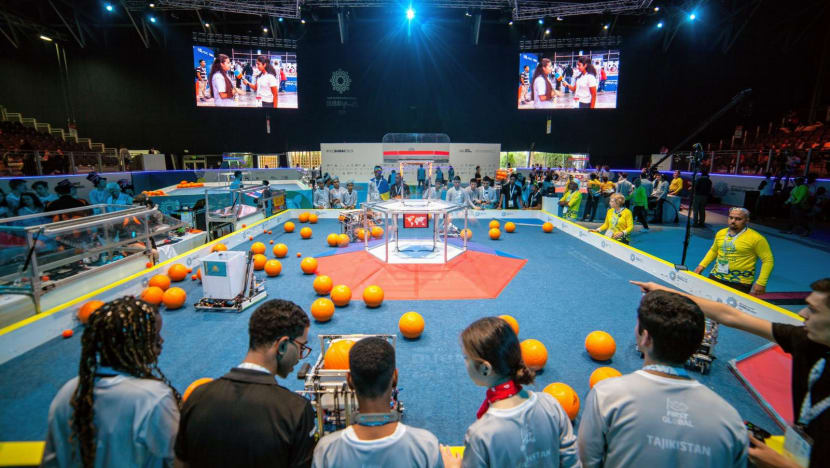International youth teams overcome adversity, foster collaboration at robotics competition in Singapore
CNA spoke to several teams that travelled far and wide to Singapore for the competition on their journey and aspirations.

Participating teams during a match at a previous edition of the FIRST Global Challenge. (Photo: First Global)
SINGAPORE: Students from 191 nations have gathered in Singapore for an international robotics tournament highlighting the importance of renewable energy and its potential to create a better future.
Into its seventh edition, the annual FIRST Global Challenge is being hosted in Southeast Asia for the first time at the Singapore Expo from Oct 7 to 10.
This year’s focus is on hydrogen, with teams building a robot and navigating it through a simulated environment to produce the resource.
In the spirit of fostering global cooperation, teams will compete against and also work with each other in randomly assigned alliances. Organisers said this will highlight the competition's core value of encouraging collaboration beyond borders.
CNA spoke to several teams that travelled far and wide to Singapore for the competition on their journey and aspirations.
TEAM UKRAINE: OVERCOMING ADVERSITY
As the war against Russia's invasion rages on, the five students from Ukraine braved air raids and a three-day long journey to make the trip to Singapore.
The team hit a stumbling block early on even as they were preparing for the competition.
Each team is supposed to build a robot out of a standard kit of parts, but the Ukrainian team did not receive theirs.
“We couldn’t receive the kit because it's very hard to send something to Ukraine from other countries (due to the ongoing war). So we had to build our robot from previous years’ kits without the game objects of this year,” said team member Ihor Honcharenko.
The team was also unable to properly concentrate due to air raid alerts.
“But (our robot) is still here and it is working. We hope to show great results despite everything,” said Mr Honcharenko.
Ms Yuliia Shevchenko, the team’s mentor, said it was also a challenge to recruit the country’s best and brightest in robotics as many students have fled to study abroad.
Mr Honcharenko added that his team’s attendance at the event is important for his country.
“It is a chance to show that Ukraine is a technologically developed country with talented people who can achieve,” he said.
“Especially in our situation, we can show that despite any challenges, despite any odds, it is possible to do anything.”
TEAM UGANDA: GIRL POWER
Uganda fielded an all-female squad this year.
Team mentor Caroline Ekyarisiima, who has a background in computer science, said it is her passion and ambition to use science, technology, engineering and mathematics (STEM) to empower girls in her country.
“I experienced a lot of challenges without role models and without support as a teen. Now that I have this chance, the first thing to do is to support my fellow young sisters to be able to have opportunities in STEM,” she said.
“If we don't uplift, empower and upskill girls and young women, then we keep leaving them behind. They won't be able to sit at the table and equally participate and discuss important issues with men.”
The team has members who have already fronted projects for local communities. Its youngest member developed a sanitary pad dispensing machine for girls in villages to keep them in school.
“Girls were dropping out of school and missing classes because they couldn't access sanitary pads. Their parents couldn’t afford to buy the whole packet, so she thought of this idea whereby a girl can use a coin to just buy one pad. This would keep her in school and help her achieve her dreams,” said Ms Ekyarisiima.
“We are using the power of STEM to create better communities, to empower girls and young women to solve problems.”
Team member Joy Akandida, who overcame financial difficulties to travel to Singapore, said she wants to fulfil her dream of becoming an engineer.
“Pursuing STEM has not been easy, but I’m passionate. When I told (the boys in my school) all about STEM and robotics, they were like, ‘but that's only for boys. How can girls do this?’
“I tell them that even if we are the only girls’ team, we want to show that girls can also build a better future. When girls and boys work together, we can build a better world.”
TEAM HOPE: RESILIENT UNDERDOGS
Team Hope, which comprises refugees and people who are stateless, said they want to help their community build a better tomorrow through technology, and change the world’s perception of those who do not have a place to call home.
Ms Yamama Al-Khatib, a 16-year-old Syrian team member who has aspirations of becoming a robotics engineer, said that refugees are resilient and capable.
“Living as a refugee is very difficult, you have to face many problems to continue your life. But as Team Hope, we are trying our best in order to live that better life, in order to change the image of refugees to the world,” she said.
“Whenever the word ‘refugee’ is mentioned, you think about tents, about dirty and (uneducated) people. But we want the world to see that refugees are not like that. Whenever we have a chance, we can achieve,” she added.
The team emerged as the underdog world champions in the 2019 edition of the tournament in Dubai.
Women in their community handweave dolls in the shape of robots for sale to fund the team’s competitions and robotics education.
Team mentor Fadi Al-haalabi, a neurosurgeon and Syrian refugee residing in Lebanon, said that refugees could develop a victim mindset that it is difficult or hopeless for them to find opportunities for the future.
He said education and continued engagement with the international community is crucial to stay connected and build a better future.
“As Syrians, it is so important for us to (think about) our future generations. With so many young Syrian refugees out of school, this is a big disaster for us,” he said.
“It is so important to consider education as the entry point to change the community, to achieve dignity and value, to inspire the community to change their situations.”
TEAM BOLIVIA: FOSTERING INCLUSIVITY
Bolivia promoted inclusivity while putting its team together this year.
All five students come from indigenous communities, which make up over 40 per cent of the nation’s population.
They were winners of the country's largest national robotics competition, beating over 3,000 like-minded youth for the chance to travel to Singapore.
Two team members, including Ms Karen Orellanna Rodriguez, hail from small towns with less than 30,000 inhabitants.
“I am very happy to be in this competition. Seeing young people from all over the world … it makes me very proud to represent my community,” she said.
The team said it is looking to prove that anyone can access technology and become good at it, regardless of age, gender, or place of birth.
It hopes to beat last year’s fourth place finish and make the top three this year.
TEAM KAZAKHSTAN: HUMBLE WINNERS
Last year’s winners Kazakhstan said their victory ignited a wave of robotics fever in the country.
More than 1,000 students participated in the selection process for this year’s event.
Team mentor Nurdaulat Dosgambet said the sharing of knowledge and collaboration were key to succeeding in the previous competition.
“It isn't about winning, it's about learning. I wouldn't say our robot was the best one. But our team was the best one because we helped other countries, and then we succeeded together with them,” he said.
“We have to make the best device (robot). But in order to win and succeed, we have to be global and be collaborative with other nations.
The team aims to bring the same strategy to the table this year, in hopes of retaining their title.
“The most important part of this event is learning new skills. But I also hope that our guys will do their best in order to beat the previous record,” he said. Last year, the team set a record for scoring the most points in the competition.
Mr Dosgambet added that even outside of the competition, Kazakhstan’s robotics talents work with neighbouring countries such as Uzbekistan and Mongolia to better each other’s technological advancement and foster a culture of collaborative learning.
He said the country is also encouraging more women to learn and work in the field of robotics, with projects in rural areas dedicated to teaching girls coding and building their own robots.



















